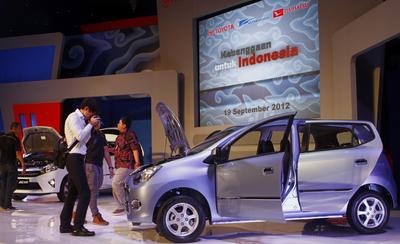With technological development and innovations in telecommunications and transportation, it is possible for firms to fragment their production process into smaller segments in which components of production or assemblies can be relocated to different places, creating global production networks. Trade and investment liberalisation in many developing countries has facilitated this process.
Product fragmentation is important for a country, especially developing countries, because it eliminates the need to gain competency in all aspects of production and allows emerging countries to enter into the network of production-sharing by focusing on the mastery of just one facet of the production process. Rather than trying to create or sustain an entire production chain, a firm can first build competency in specialised segments of the production chain as a stepping stone to more complex production and ultimately economic development.
In the case of Indonesia, however, its participation in the electronics and automotive global production networks has been relatively slow compared to other East Asian countries. The ratio of exports of parts and components to GDP in 2010 for Indonesia was less than 1 per cent (for electronics) and less than 2 per cent (for automotives), while Thailand was 7.3 per cent for automotives and the Philippines was 13.5 per cent for electronics.
Both multinational and domestic firms face several obstacles to engage in the global production networks from Indonesia. The first challenge is the less friendly business environment. Although Indonesia adopted a new investment law in 2007, which is considered a landmark piece of legislation, the implementing regulations are still lagging. The provision of a ‘negative list’ of sectors in which private investment is not permitted or where foreign investors are subject to restrictions has added to transparency, and this list has subsequently been streamlined. However, a lack of uniform interpretation of the investment law and the negative list has created confusion and uncertainty for investors.
Moreover, the foreign-ownership restrictions imposed by the government on 25 different sectors is a major concern for multinational corporations, especially in those industries that are technology-intensive and have proprietary rights, such as the electronics and automotive sectors. These industries are afraid that their technology will be imitated by domestic firms. In fact, Indonesia was an early recipient of foreign multinational firms trading in electronics. For instance, Fairchild and National Semiconductor both established plants in Indonesia in the early 1970s. Yet both firms closed their operations in Indonesia in the 1980s because of the unfavourable business environment.
The second challenge is the quantity and quality of Indonesia’s infrastructure, which is very crucial for the global production networks to ensure the just-in-time delivery requirements in both the automotive and electronics industries. According to IMD’s World Competitiveness Yearbook, poor infrastructure conditions are considered the second most problematic factor for doing business in Indonesia, while it was also ranked 56th among 59 countries in 2012 for the adequacy of its infrastructure, and was far behind Malaysia (26th) and Thailand (49th). Additionally, a survey by the Japan External Trade Organization ranks underdeveloped infrastructure as the most important barrier to investment in the Indonesian manufacturing sector and the third most important barrier in the services sector.
The third challenge is the quality and availability of skilled labour. Labour productivity and technology capability are closely related to a country’s education and skill levels — and the quality of Indonesia’s human capital still lags behind its neighbours. The completion rate of tertiary education in Indonesia is very low, at only 1.4 per cent in 2010. Comparing Indonesia with other Southeast Asian countries reveals that for the quality of its labour force, Indonesia was the second-lowest of 10 countries in 2010, with Cambodia being the lowest. As with skill level, Indonesia’s technology capacity is also still limited. One indicator is the very low rate of investment in research and development (R&D). This was the case not only for the public sector, but also for foreign companies operating in Indonesia. A survey by the US Bureau of Economic Analysis shows that R&D investment as a percentage of employee compensation in US-majority affiliates in Indonesia is only 0.6 per cent, the lowest rate when compared to other Asian countries (such as South Korea, Singapore, China and Malaysia). The highest percentage is found in Singapore and Taiwan, at about 19 per cent, followed by China (14.9 per cent) and Malaysia (11.2 per cent). The reluctance of US affiliates to invest in R&D is closely related to Indonesia’s ownership restrictions.
With these challenges in mind, Indonesia needs to improve its investment policies and business environment in general, as well as infrastructure conditions and education levels to increase its participation in global production networks.
Moekti P. Soejachmoen is Senior Economist at the Support for Economic Analysis Development in Indonesia Project, sponsored by USAID.

